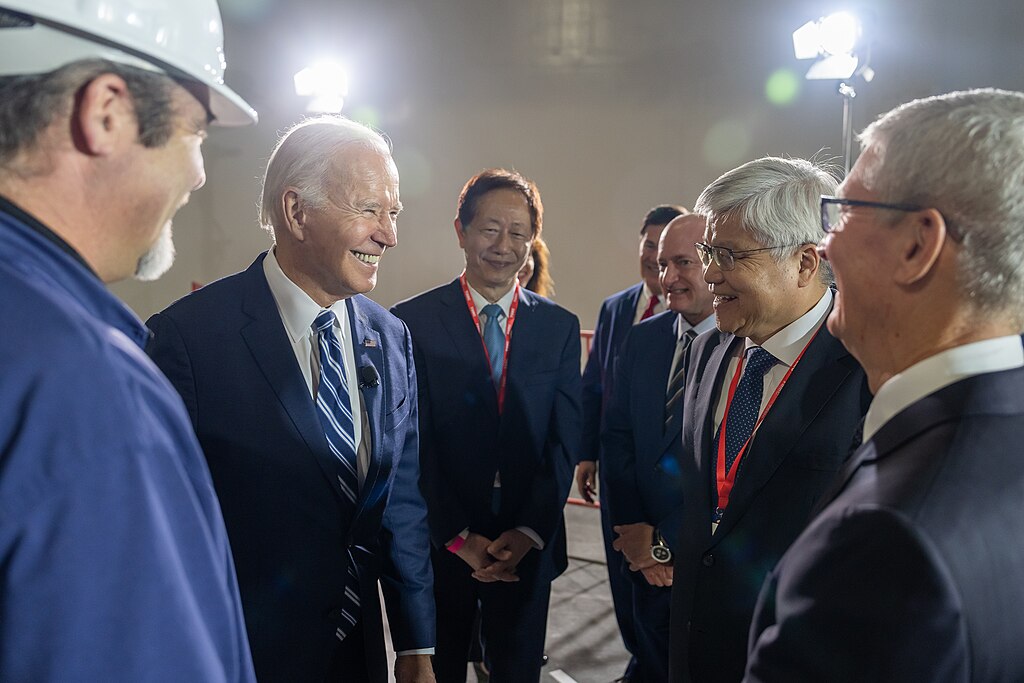Taiwan Semiconductor Manufacturing Co. (TSMC) has started producing advanced 4-nanometer chips in Arizona, marking a milestone in the Biden administration's semiconductor strategy. U.S. Commerce Secretary Gina Raimondo highlighted this achievement as the first instance of leading-edge chip production on American soil, with quality and yield matching Taiwan's standards.
The $6.6 billion grant from the U.S. Commerce Department to TSMC's Arizona unit underscores the federal push for domestic semiconductor manufacturing. In April, TSMC expanded its investment plans by $25 billion, bringing its total U.S. commitment to $65 billion, including a third Arizona fab set to open by 2030.
TSMC’s second Arizona fab, expected to begin production in 2028, will feature 2-nanometer technology, the world's most advanced. Additionally, the company agreed to deploy its cutting-edge "A16" manufacturing technology in Arizona. The U.S. government also approved up to $5 billion in low-cost loans to support TSMC's efforts.
This initiative aligns with Raimondo’s goal to produce 20% of the world’s leading-edge logic chips domestically by 2030, up from 0% before TSMC’s Arizona operations began.
Separately, Commerce granted $407 million to Amkor Technology to develop a $2 billion advanced semiconductor packaging facility in Arizona. This plant, the largest of its kind in the U.S., will test and package millions of chips for applications like autonomous vehicles, 5G/6G, and data centers. Apple will be a key customer, sourcing chips produced at TSMC’s nearby facility.
These investments are part of a broader $52.7 billion federal program to bolster semiconductor manufacturing and research, securing America's leadership in advanced technology.



 Anthropic Eyes $350 Billion Valuation as AI Funding and Share Sale Accelerate
Anthropic Eyes $350 Billion Valuation as AI Funding and Share Sale Accelerate  Instagram Outage Disrupts Thousands of U.S. Users
Instagram Outage Disrupts Thousands of U.S. Users  Prudential Financial Reports Higher Q4 Profit on Strong Underwriting and Investment Gains
Prudential Financial Reports Higher Q4 Profit on Strong Underwriting and Investment Gains  SoftBank Shares Slide After Arm Earnings Miss Fuels Tech Stock Sell-Off
SoftBank Shares Slide After Arm Earnings Miss Fuels Tech Stock Sell-Off  Tencent Shares Slide After WeChat Restricts YuanBao AI Promotional Links
Tencent Shares Slide After WeChat Restricts YuanBao AI Promotional Links  Ford and Geely Explore Strategic Manufacturing Partnership in Europe
Ford and Geely Explore Strategic Manufacturing Partnership in Europe  Jensen Huang Urges Taiwan Suppliers to Boost AI Chip Production Amid Surging Demand
Jensen Huang Urges Taiwan Suppliers to Boost AI Chip Production Amid Surging Demand  SoftBank and Intel Partner to Develop Next-Generation Memory Chips for AI Data Centers
SoftBank and Intel Partner to Develop Next-Generation Memory Chips for AI Data Centers  SpaceX Pushes for Early Stock Index Inclusion Ahead of Potential Record-Breaking IPO
SpaceX Pushes for Early Stock Index Inclusion Ahead of Potential Record-Breaking IPO  Nvidia Confirms Major OpenAI Investment Amid AI Funding Race
Nvidia Confirms Major OpenAI Investment Amid AI Funding Race  Uber Ordered to Pay $8.5 Million in Bellwether Sexual Assault Lawsuit
Uber Ordered to Pay $8.5 Million in Bellwether Sexual Assault Lawsuit  Elon Musk’s Empire: SpaceX, Tesla, and xAI Merger Talks Spark Investor Debate
Elon Musk’s Empire: SpaceX, Tesla, and xAI Merger Talks Spark Investor Debate  Global PC Makers Eye Chinese Memory Chip Suppliers Amid Ongoing Supply Crunch
Global PC Makers Eye Chinese Memory Chip Suppliers Amid Ongoing Supply Crunch  Nintendo Shares Slide After Earnings Miss Raises Switch 2 Margin Concerns
Nintendo Shares Slide After Earnings Miss Raises Switch 2 Margin Concerns  Baidu Approves $5 Billion Share Buyback and Plans First-Ever Dividend in 2026
Baidu Approves $5 Billion Share Buyback and Plans First-Ever Dividend in 2026  Alphabet’s Massive AI Spending Surge Signals Confidence in Google’s Growth Engine
Alphabet’s Massive AI Spending Surge Signals Confidence in Google’s Growth Engine  Nvidia, ByteDance, and the U.S.-China AI Chip Standoff Over H200 Exports
Nvidia, ByteDance, and the U.S.-China AI Chip Standoff Over H200 Exports 































